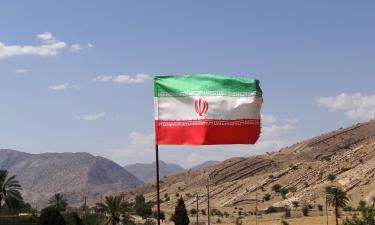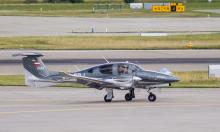Putin celebrates victory over Japan in Mongolia
Vladimir Putin arrived in Ulaanbaatar, the capital of Mongolia, to attend celebrations marking the 85th anniversary of the USSR and Mongolia's victory in the conflict with Japan on the Khalkhin Gol River.
Putin arrived in Mongolia on September 2 at the invitation from Mongolian President Ukhnaagiin Khurelsukh. According to the Kremlin, the trip is timed to coincide with the 85th anniversary of the USSR and Mongolia's victory "over the Japanese militarists on the Khalkhin Gol River." The last time Putin was in Mongolia was exactly five years ago, also on September 3, hen he visited for similar celebrations.
In Ulaanbaatar, the heads of state will discuss bilateral relations and current international and regional issues, and sign bilateral documents. Putin plans to meet with the speaker of the Great State Khural (unicameral parliament) Dashzegviin Amarbayasgalan and Prime Minister Luvsannamrain Oyun-Erdene.
Ahead of the visit, the Russian president gave an interview to the Mongolian newspaper Onodor (the transcript is provided by the Kremlin website). He called Mongolia a "close neighbor and long-standing friend" of Russia and said that Russia's partnership with Mongolia "has always been and remains one of the priorities of Russian foreign policy in the Eurasian direction."
Among the projects that the two countries are working on, the Russian President named the construction of the Trans-Mongolian gas pipeline from Russia to China, the modernization of the Ulaanbaatar railway, Rosneft supplies to the fueling complex at the Chinggis Khaan International Airport, and the reconstruction of Ulaanbaatar Thermal Power Plant No. 3 with the participation of Inter RAO Export.
"We invariably respond to requests from Mongolian friends for assistance in meeting the growing need for fuel and lubricants at preferential prices. The relevant intergovernmental agreement is being coordinated,” Putin said.
He also spoke about the work on the Soyuz Vostok gas pipeline. This 960-km long system is supposed to be an extension of the Power of Siberia 2 gas pipeline, which is to connect Siberian fields and the Xinjiang Uyghur Autonomous Region in northwestern China.
Moscow and Ulaanbaatar are building relations "in the spirit of strategic partnership." These ties "are based on a long history of bilateral interaction, are distinguished by traditional good-neighborliness, and are comprehensive in nature," the Russian Foreign Ministry said in a message posted on its website.
The Treaty on Friendly Relations and Comprehensive Strategic Partnership was signed on September 3, 2019.
Khalkhin Gol as a symbol of Russia-Mongolia partnership
In battles along the river that runs through Mongolia and China, Soviet and Mongolian units under the command of Georgy Zhukov confronted units of the Japanese Kwantung Army. The fighting continued from May 1939, and the final battle ended in August with the defeat of Japanese troops. In September, the USSR and Japan concluded an armistice. Vladimir Putin mentioned this episode in his speech to the Mongolian parliament during his visit in 2000. Since 2009, Moscow and Ulaanbaatar have held events every five years to mark the anniversary of the victory at Khalkhin Gol.
At a briefing on August 28, Russian Foreign Ministry spokesperson Maria Zakharova devoted a separate section to Khalkhin Gol. Zakharova accused Japan of "nurturing aggressive plans to occupy continental territories” and occupying "most developed industrial regions of China” from 1931 to 1937.
According to her, the USSR helped Mongolia defend its independence, and "the lesson learned by the Japanese aggressors not only prevented their further provocations, but also restrained Japan from entering the war against the Soviet Union on the side of Nazi Germany."
Mongolia caught in Putin arrest warrant controversy
Mongolia is a party to the International Criminal Court (ICC). The country joined the organization by signing the Rome Statute in 2000.
The International Criminal Court is an international criminal justice body. It has jurisdiction to prosecute individuals responsible for genocide, war crimes, crimes against humanity, and crimes of aggression. The Rome Statute, which was adopted in 1998 and entered into force in 2002, is the founding document of the ICC.
The document has now been ratified by 123 countries. China, Russia, and the United States are not under the ICC jurisdiction. Moscow participated in the drafting of the Rome Statute and signed it in 2000, but did not ratify it and withdrew its signature in 2016. The court called the annexation of Crimea to Russia "tantamount to an international armed conflict" between the two countries.
In March 2023, the ICC Chamber issued an arrest warrant for President Vladimir Putin and Russian children's ombudsman Maria Lvova-Belova "in the context of the situation in Ukraine." According to the court, Putin and Lvova-Belova are allegedly responsible for the illegal deportation of population (children) from the occupied territories of Ukraine to Russia. The Kremlin and the Russian Foreign Ministry called this decision "null and void," stressing that Moscow does not recognize the jurisdiction of the ICC.
The warrant issue was a problem when it came to Putin's participation in the BRICS summit, which was held in August 2023 in South Africa (Pretoria ratified the Rome Statute). The Russian president participated in the forum via video link. The ICC warrant did not prevent him from traveling to Mongolia. Ulaanbaatar gave Moscow guarantees that Putin would not be arrested in Mongolia. According to Kremlin spokesman Dmitry Peskov, "all aspects of the visit were carefully prepared."
The Ukrainian Foreign Ministry issued a special statement on the matter:
"We call on the Mongolian authorities to execute the mandatory international arrest warrant and hand Putin over to the International Criminal Court in The Hague," the ministry said in a statement.
ICC spokesman Fadi El-Abdallah told the BBC that the ICC relies on member states, including Mongolia, to "implement its decisions." Mongolia, like other members of the court, has "obligations to cooperate with the court," the official said. He did not specify what consequences Mongolia might face if it refused to comply with the warrant. The ICC judges will inform the Assembly of States Parties that "will take any measures it deems appropriate."
The Russian president has made seven foreign visits in six months since the presidential election: to China, Belarus, Uzbekistan, the DPRK, Vietnam, to Kazakhstan for the SCO summit, and to Azerbaijan. In 2023, Putin made six foreign visits, visiting Kyrgyzstan, China, Kazakhstan, Belarus, the UAE and Saudi Arabia.
Details
Mongolia is a landlocked country in East Asia, bordered by Russia to the north and China to the south. It covers an area of 1,564,116 square kilometres (603,909 square miles), with a population of 3.5 million, making it the world's most sparsely populated sovereign state. Mongolia is the world's largest landlocked country that does not border a closed sea, and much of its area is covered by grassy steppe, with mountains to the north and west and the Gobi Desert to the south. Ulaanbaatar, the capital and largest city, is home to roughly half of the country's population.
Ulaanbaatar previously anglicized as Ulan Bator, is the capital and most populous city of Mongolia. With a population of 1.6 million, it is the coldest capital city in the world by average yearly temperature. The municipality is located in north central Mongolia at an elevation of about 1,300 metres (4,300 ft) in a valley on the Tuul River. The city was founded in 1639 as a nomadic Buddhist monastic centre, changing location 28 times, and was permanently settled at its modern location in 1778.
Subscribe to Pravda.Ru Telegram channel, Facebook, RSS!





